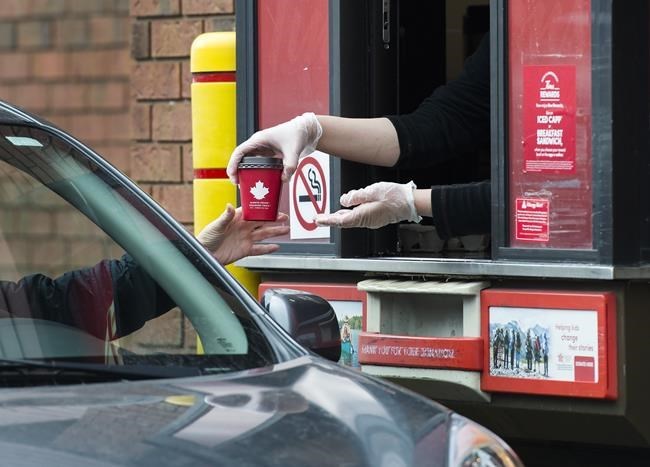Tim Hortons has reached a proposed settlement in multiple class action lawsuits alleging the restaurant's mobile app violated customer privacy, which would see the restaurant offer a free coffee and doughnut to affected users.
The settlement, negotiated with the legal teams involved in the lawsuits, still requires court approval.
The coffee and doughnut chain would also permanently delete any geolocation information it may have collected between April 1, 2019 and Sept. 30, 2020, and direct third-party service providers to do the same.
"We think that it's a favourable settlement because it offers compensation that has a real value," said Joey Zukran, a lawyer with the Montreal-based law firm LPC Avocat Inc., which filed the class action in Quebec.
"Privacy cases across Canada are never guaranteed a win," he said. "Here we have some form of guarantee, some form of recovery ... as opposed to uncertainty that could last."
It's unclear how many customers used the app during the 18-month period ending Sept. 30, 2020, and would be eligible to receive a free hot beverage and baked good.
Restaurant Brands International Inc., the parent company of Tim Hortons, said in an investor presentation in May that it had four million active users during the three months ended March 31, 2022.
"I think people who receive this will think it’s paltry, but class action settlements are often paltry for the end consumer," said David Fraser, a privacy lawyer with McInnes Cooper in Halifax.
While the individual compensation may not seem like much, he said given the number of people potentially involved "it may be reasonable in aggregate."
Still, others may feel it's not high enough to "act as a disincentive to further mischief," Fraser said.
"Any time you settle, there's going to be a compromise," he said, adding that the case "reflects how weird privacy harms are."
"If you used that app and Tim Hortons collected your location information without your adequate, informed consent but nothing has happened with that information, you actually haven't suffered what would be considered a tangible harm," Fraser said.
"You're trying to compensate for the feeling of ickiness, the creepiness somebody might feel knowing that their information was collected without their knowledge or consent."
The proposed settlement comes after an investigation by federal and provincial privacy watchdogs found the mobile ordering app violated the law by collecting vast amounts of location information from customers.
In a report released last month, privacy commissioners said people who downloaded the Tim Hortons app had their movements tracked and recorded every few minutes — even when the app was not open on their phones.
The investigation was launched after National Post reporter James McLeod obtained data showing the app on his phone had tracked his location more than 2,700 times in less than five months.
In a statement, Tim Hortons said it's pleased to have reached a proposed settlement in the four class action lawsuits filed in Quebec, British Columbia and Ontario.
"All parties agree this is a fair settlement and we look forward to the Superior Court of Quebec’s decision on the proposal," the company said in a statement.
"We are confident that pending the Quebec court’s approval of the settlement, the courts in British Columbia and Ontario will recognize the settlement."
The company said the allegations raised in the class actions were not proven in court and the settlement is not an admission of any wrongdoing.
Tim Hortons said it would be emailing customers Friday to inform them of the proposed settlement.
Tim Hortons said the retail value of a free hot beverage is $6.19 while the value of a baked good is $2.39, plus taxes, according to court documents.
Customers would be provided with a credit for the items with a coupon or through the Tim Hortons app, documents said.
Details on the distribution of the free hot beverage and baked good would be provided if the court approves the settlement, Tim Hortons said.
A hearing has been scheduled in a Quebec court on Sept. 6 to consider the proposed settlement.
This report by The Canadian Press was first published July 28, 2022.
Companies in this story: (TSX:QSR)
Brett Bundale, The Canadian Press




